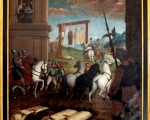
On this day in history events for 2nd to 8th May.
[Read More...]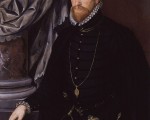
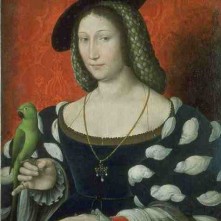
Marguerite de Navarre
1492 – Birth of Marguerite de Navarre (also known as Marguerite of Angoulême and Marguerite de France), sister of Francis I of France, daughter of Louise of Savoy and Charles, Count of Angoulême, and author of "Miroir de l'âme pécheresse".
1533 – The Royal Council was ordered by Henry VIII to recognise Anne Boleyn as Queen.
1548 – Death of Sir John Welsbourne, Gentleman of the Privy Chamber to Henry VIII and Justice of the Peace.
1554 - Sir Thomas Wyatt the Younger was beheaded and then his body quartered for treason, for leading Wyatt's Rebellion against Queen Mary I.
1609 - Death of John Lumley, 1st Baron Lumley, conspirator (Ridolfi Plot, patron and collector. His library was said to be one of the largest in England, and he collected manuscripts, books, paintings, sculptures, marble busts and furniture. Lumley was buried at night, probably so that he could be buried with a Catholic service, in the Lumley Chapel of St Dunstan's in Cheam.
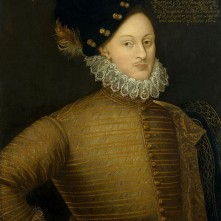
Edward de Vere
1533 – Thomas Cromwell became Chancellor of the Exchequer.
1533 - Anne Boleyn attended mass on Easter Saturday “with all the pomp of a Queen, clad in cloth of gold, and loaded (carga) with the richest jewels”. It was her first public appearance as Queen, and it was time to make a statement that she was Henry VIII’s rightful wife and Queen.
1535 – Death of Giles Duwes (Dewes), musician, royal librarian and French tutor to Henry VIII's children: Arthur, Henry, Margaret and Mary, and to Henry VIII's daughter, the future Mary I. He also taught Mary I music. He was buried in the church of St Olave Upwell in London.
1550 – Birth of Edward de Vere, 17th Earl of Oxford, courtier and poet. The Oxfordian theory of Shakespearean authorship proposes that de Vere wrote Shakespeare's works and some believe that he was the illegitimate son of Elizabeth I.
1587 – Death of Sir Thomas Bromley, Lord Chancellor to Elizabeth I, at York House in London. He was buried in Westminster Abbey. It was Bromley who had presented Elizabeth I with Parliament's petition for the execution of Mary, Queen of Scots, and it was he who applied the Great Seal on her execution warrant in 1587.
1639 – Death of courtier Robert Carey, 1st Earl of Monmouth, youngest son of Henry Carey, 1st Baron Hunsdon, and grandson of Mary Boleyn.
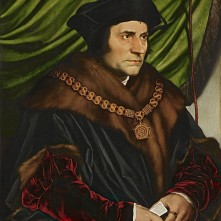
Sir Thomas More
1534 – Sir Thomas More was summoned to Lambeth to swear his allegiance to the “Act of Succession”.
1557 – Death of John Brydges, 1st Baron Chandos of Sudeley, landowner, soldier and Lieutenant of the Tower of London. He died at Sudeley Castle. When Lady Jane Grey was in the Tower, she gave him her English prayer book in which she wrote a homily for him, and when Elizabeth was in the Tower, he was accused of being too lenient with her.
1598 – Henry IV of France issued the Edict of Nantes granting the Huguenots freedom of religion in France.
1606 – Death of Richard Day, Church of England clergyman, printer and son of the famous printer John Day, who had printed John Foxe's “Actes and Monuments”. In 1578 Richard printed his own translation of “Christ Jesus Triumphant” by Foxe, and then got into trouble with his father when he started printing his father's works without his permission. His father had his printing equipment and stock seized, and Richard was forced to become a clergyman, becoming Vicar of Mundon, Essex.
1630 – Death of Anne Howard (née Dacre), Countess of Arundel, at Shifnal. She was laid to rest in the Fitzalan Chapel of Arundel Castle. Anne was the eldest daughter of Thomas Dacre, 4th Lord Dacre of Gilsand, and wife of Philip Howard, 13th Earl of Arundel. Anne was a staunch Catholic and harboured priests.
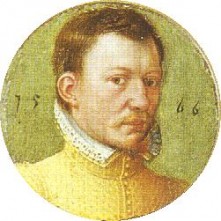
Bothwell
1556 – Death of Sir Anthony Kingston, former Constable of the Tower of London, at Cirencester while on his way to be tried in London. He was accused of conspiring to rob the Exchequer for money to support Henry Dudley and his plot against Mary I. Dudley appears to have been planning an invasion of English exiles from France to topple Mary and replace her with Elizabeth.
1565 – Birth of Edward Gresham, astrologer, astronomer and magician, in Stainsford, Yorkshire. He is known for his treatise “Astrostereon” and his astrological almanacs, published between 1603 and 1607.
1578 - James Hepburn, 1st Duke of Orkney and 4th Earl of Bothwell, died aged forty-four at Dragsholm Castle after being imprisoned and held in appalling conditions by Frederick, King of Denmark. It is said that the imprisonment caused Bothwell to go insane. Bothwell was the third husband of Mary, Queen of Scots.
1587 – Death of Edward Manners, 3rd Earl of Rutland, at Greenwich. He'd been taken ill earlier that month. He was buried on 15th May at Bottesford, Leicestershire.
1599 – Death of Sir Henry Wallop, member of Parliament and administrator, in Dublin while serving there as Treasurer-at-War. He was buried in St Patrick's Cathedral, Dublin.
1530 – Death of Gilbert Tailboys, 1st Baron Tailboys and first husband of Elizabeth (Bessie Blount), mistress of Henry VIII. He was laid to rest in South Kyme Church.
1545 – Death of Sir Robert Dymoke, champion at the coronations of Henry VII and Henry VIII. He also served in the households of Catherine of Aragon and Anne Boleyn.
1589 – Burial of Frances Radcliffe (née Sidney), Countess of Sussex and founder of Sidney Sussex College, Cambridge. She was buried in Westminster Abbey, in the Chapel of St Paul.
1599 – Robert Devereux, 2nd Earl of Essex, was sworn in as Lord Lieutenant of Ireland.
1624 – Burial of Sir John Scudamore, husband of Mary Shelton, who served in Elizabeth I's Privy Chamber, at Holme Lacy. It was alleged that Elizabeth I broke one of Mary's fingers in a temper.
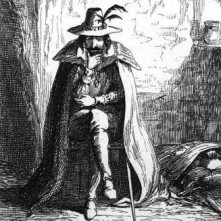
Guy Fawkes
1512 – The Mary Rose began her first tour of duty in the English Channel on the hunt for French warships.
1521 – German Protestant reformer, Martin Luther, appeared in front of Emperor Charles V at the Diet of Worms. He had been summoned to the diet to either recant or reaffirm his religious views.
1550 – Birth of Francis Anthony, alchemist, apothecary and physician. He was probably born in London and was the son of Derrick Anthony, a goldsmith. Anthony was imprisoned twice for practising as a physician without a licence, and is known for his aurum potabile (drinkable gold), made from gold and mercury, which he claimed had amazing curative powers. His works included Medicinae chymicae et veri potabilis auri assertio (1610).
1570 - Baptism of Guy Fawkes, conspirator, at the Church of St Michael le Belfrey in York.
1578 – Burial of Thomas Drant, Church of England clergyman and poet. He was part of the “Areopagus” intellectual circle at court, but also had an ecclesiastical career and was chaplain to Edmund Grindal, Bishop of London. He is known for his work on prosody (metre), and actually drew up some rules concerning it, which were mentioned by Edmund Spenser, Gabriel Harvey, Philip Sidney, Edward Dyer and Fulke Greville.
1587 – Death of Anne Seymour (née Stanhope), Duchess of Somerset and wife of Edward Seymour, Duke of Somerset and Lord Protector during part of Edward VI's reign. Anne was a reformer and a literary patron. She died at Hanworth Place and was buried at Westminster Abbey.
1595 – Death of Ferdinando Stanley, 5th Earl of Derby and literary patron. His sudden death caused rumours of poisoning and witchcraft, but nothing was ever proved. Stanley was patron of the Strange's Men company of players, which probably included William Shakespeare, and he was also a patron of poets. It is thought that he also was a poet.
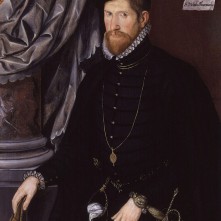
Nicholas Throckmorton
1534 - Sir Thomas More, Henry VIII's Lord Chancellor, was sent to the Tower of London after refusing to swear the “Oath of Succession”.
1554 – Sir Nicholas Throckmorton was acquitted of treason for being involved in Wyatt's Rebellion. The jurors were arrested straight after the trial and Throckmorton remained in prison until January 1555.
1554 – Thomas Wyatt the Younger's head was stolen in the rejoicing after Throckmorton's acquittal.
1554 – Birth of Stephen Gosson, Church of England clergyman, satirist and anti-theatrical polemicist. In 1579 he published his “Schoole of Abuse, containing a pleasant invective against Poets, Pipers, Plaiers, Jesters and such like Caterpillars of the Commonwealth”.
1568 – Birth of George Brooke, conspirator, son of William Brooke, 10th Baron Cobham and his wife Frances (née Newton). Brooke conspired with Sir Griffin Markham and William Watson to kidnap King James I and end the persecution of Catholics. The plot was called the Bye Plot, and never took place because the authorities found out about their plans. Brooke was arrested, tried at Winchester 15th November 1603 and executed on Winchester Castle green 5th December 1603.
1595 – Execution of Henry Walpole (St Henry Walpole), Jesuit martyr, in York. He was hanged, drawn and quartered. He was accused of treason on three counts "Walpole had abjured the realm without licence; that he had received holy orders overseas; and that he had returned to England as a Jesuit priest to exercise his priestly functions".
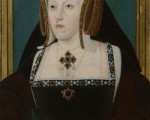
On 9th April 1533, the Dukes of Norfolk and Suffolk accompanied by a delegation from King Henry VIII met with Queen Katherine of Aragon at her residence at Ampthill where she had been moved to in February. When they arrived they informed Katherine that she was no longer Queen of England, but from that day forward she had to style herself as the Dowager Princess of Wales. Katherine took the news with grace but refused neither to use the new title nor to believe that Henry’s marriage to Anne Boleyn was valid.
[Read More...]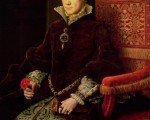
On 30th March 1558, Queen Mary I made her last will and testament, believing that she would soon give birth and knowing that childbirth was a risky process.
[Read More...]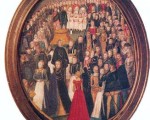
Maundy Thursday commemorates the Last Supper, that final meal that Jesus Christ had with his disciples before his arrest.
In Tudor times, on Maundy Thursday, the church was prepared for Easter with water and wine being used to wash the altars and it was traditional for people to go to confession. The three holy oils – the chrism oil, the oil of catechumens and the oil of the sick – were also blessed on this day.
At the Last Supper, which was the Passover meal, Luke’s Gospel says that Christ took bread, gave thanks to God for it, broke it and then shared it with his disciples, saying “This is my body given for you; do this in remembrance of me.” He then took the cup of wine, saying, “This cup is the new covenant in my blood, which is poured out for you.” Christians all over the world remember this gesture by celebrating the Eucharist, also known as “communion”. According to John’s Gospel, it was at this meal that Jesus washed his disciples’ feet, and both Luke and John record Jesus saying that there was one among them who would betray him.
[Read More...]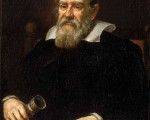
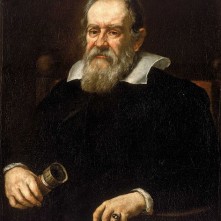
Galileo Galilei
1499 – Death of James Goldwell, Bishop of Norwich, at the bishop's palace in Hoxne, Suffolk. He was buried in Norwich Cathedral, in the chantry chapel.
1503 – Death of Henry Deane, administrator and Archbishop of Canterbury. As well as serving Henry VII as Archbishop, Deane also served as Chancellor of Ireland, Deputy Governor for Prince Henry and Keeper of the Great Seal. He died at Lambeth Palace and was buried at Canterbury Cathedral at a lavish funeral.
1536 – Death of Richard Rawlins, Bishop of St David's and former warden of Merton College.
1551 - Thomas Arden, businessman and inspiration for the 1592 Elizabethan play, “The Tragedie of Arden of Feversham and Blackwill”, was murdered by his wife, Alice, and her lover, Thomas Morsby, and conspirators.
1564 – Birth of Galileo Galilei, the Italian physicist, mathematician, astronomer, and philosopher, in Pisa, Italy. He was one of the central figures of the Scientific Revolution and supported Copernicanism (the heliocentric model). He has been referred to as “the Father of Modern Science”, “the Father of Modern Physics” and “the father of modern observational astronomy”. He is also known for his discovery of the Galilean Moons (Jupiter's satellites), his improved military compass and his work on the telescope.
1571 – Death of Sir Adrian Poynings, soldier. He served as a soldier in Boulogne from 1546 to 1550, when he was made Lieutenant of Calais Castle, then in the St Quentin campaign of 1557 and in Le Havre in 1562.
1598 – Death of John May, Bishop of Carlisle, at Rose Castle, his episcopal residence. He was buried in Carlisle Cathedral.
1616 – Death of Sir George Carey, Lord Deputy of Ireland. He was buried at Cockington, Devon.
[Read More...]
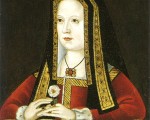
On 11th of February 1466, Elizabeth of York was born at the Palace of Westminster. Exactly thirty seven years later, at the Tower of London, Elizabeth died shortly after giving birth to her last child.
Elizabeth of York was the eldest child of King Edward IV and his wife Queen Elizabeth Woodville. Elizabeth was christened in St Stephen’s Chapel in Westminster Abbey. Jacquetta of Luxembourg, Duchess of Bedford, and Cecily Neville, Duchess of York, stood as her godmothers and Richard Neville, Earl of Warwick, stood as her godfather.
[Read More...]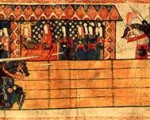
]During a jousting event on this day in history, 24th January 1536, Henry VIII fell from his horse and in full armour was crushed under the weight of the animal. Eustace Chapuys, ambassador to Charles V wrote:
“On the eve of the Conversion of St. Paul, the King being mounted on a great horse to run at the lists, both fell so heavily that every one thought it a miracle he was not killed.”
Many articles and even whole books have been written about this fateful event and how such a traumatic experience, both physically and psychologically, may have permanently changed the King’s mental stability. This article, however, instead explores a little of the history of the joust and why Henry VIII was such a fervent lover of the sport.
[Read More...]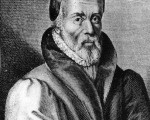
As today is the anniversary of the execution of reformer, scholar and Bible translator, William Tyndale, Sarah Bryson has written an article on this fascinating man.
William Tyndale was born in Gloucestershire in 1494 to parents who worked in the cloth trade. Tyndale was born into a Catholic dominated England under the rule of Henry VII. He was brought up a strict and devout Catholic being taught the importance of mass and good works which would help him gain access to heaven. He would have participated in regular confession and penance and his daily life would have been dominated by Saints’ days and following the Catholic faith. The Bible that Tyndale would have known growing up would have been written in Latin, the holy language. Meanwhile the common people would have spoken English, a rough language which was not considered suitable for the holiness of the Church.
[Read More...]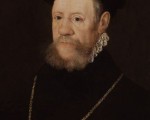
On 29th September 1553, Michaelmas or the Feast of St. Michael and All Angels, Mary I created fifteen1 Knights of the Bath as part of her coronation celebrations.
[Read More...]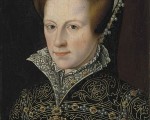
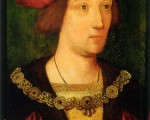
Elizabeth of York, daughter of Edward IV, got pregnant straight after her marriage to Henry VII in January 1486 and the news of her pregnancy was celebrated throughout England. Henry VII, was ecstatic at the news and decided that the birth of his first-born would take place at Winchester, the place believed to have been the capital of the legendary Camelot and the site of King Arthur’s castle, and that the child would be called Arthur. Henry was convinced that Arthur’s birth would bring about a new golden age.
[Read More...]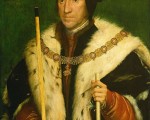
On the 9th September 1513, while Henry VIII was away, busy campaigning against the French, James IV and his Scottish troops crossed the border and challenged the English force, which was headed by Thomas Howard, the Earl of Surrey, at Flodden in Northumberland.
[Read More...]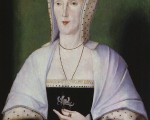
Margaret Pole, or Margaret Plantagenet, was the daughter of George, Duke of Clarence – brother of two Plantagenet kings: Edward IV and Richard III – and his wife Lady Isabella Neville, daughter of Richard Neville, 16th Earl of Warwick and a man known as ‘the Kingmaker’. Margaret was born on 14th August 1473 and she married Sir Richard Pole in 1491, having five children before she was widowed in 1505. One of her children was Reginald Pole who became a cardinal and then Archbishop of Canterbury during the reign of Mary I.
[Read More...]